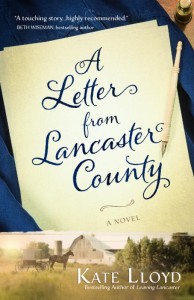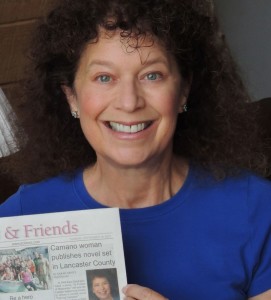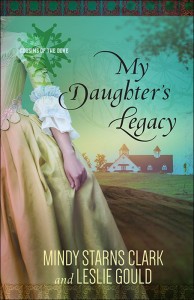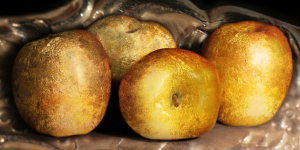A Letter from Lancaster County

By Kate Lloyd
Angela
Her mother’s untimely death, a struggling marriage, a strained relationship with her sister, Rose, and regrets over what might have been haunt her. Despite being a wife and mother, she feels she has little to show for her life.
Rose
Still single, she longs for a husband and children. But Angela has all that and still isn’t happy. Rose wants to be closer to her older sister, but she and Angela couldn’t be more different. Both strong women, will their sibling rivalry ever end?
* * *
When a letter arrives from Lancaster County, Pennsylvania, Angela and Rose decide to visit Aunt Silvia, their mother’s Mennonite sister, in the heart of Amish country. This vacation could provide the opportunity both sisters need to sort out their issues. And yet instead of finding a new way of connecting with each other, Angela and Rose discover surprising family secrets that add to their strife and threaten Rose’s romance with a new beau.
Through it all, the two sisters must find the faith necessary to face their personal problems and allow God to restore hope and healing to their hearts and relationship as only He can.
ISLAND BREEZES
A letter from a long unseen aunt has two sisters getting on a plane for a long flight together. Doesn’t sound too bad, does it? Think again. These sisters can barely stand to be in the same room.
They only plan to stay a short time, but can they even make it a couple weeks? The relationship goes further downhill when a male becomes part of the equation.
Most of Angela and Rose’s differences seem to stem from misunderstandings when they were growing up, but they never discuss any of that to even try to smooth things out.
Thank you, Ms Lloyd for a twist on Amish fiction. I’m looking forward to reading Simply Delicious.
***I received this book free of charge from Litfuse.***
Preview of first chapter from AmishReader.com
Prologue
Silvia Donato’s hand shook as she put her pen’s tip to the stationery.
She hesitated, but then prodded herself no matter how
much her fingers ached. This was her last chance to repair much of
what had gone wrong. Before it was too late.
Dearest Angela and Rose,
Please visit me. This invitation may sound crazy. After
so many years, I wouldn’t blame you if you couldn’t
care less about your aunt. But I’m getting older, and
how I regret not asking you sooner, as well as the tension
between your mother and me that separated us for so long.
How can I entice you to travel clear across the country?
For one thing, I still live in your grandparents’
house where your mother grew up. You might wish to
take a memento home with you. Anything you like. Lancaster
County is truly magnificent. To my way of thinking,
autumn is its finest season. Please come.
Fondly,
Aunt Silvia
One
Angela
My younger sister and I trailed our cousin Phyllis across
the slate path toward Aunt Silvia’s house. I inhaled Lancaster
County’s earthy farmland aromas and a trace of smoke wafting
through a wooded area, up from the valley below. Horses clip-clopping
in the distance sounded like muted steeple bells from another century.
A kaleidoscope of expectations swirled through my chest. I felt as
if I were a little girl opening a present, discovering Santa had delivered
exactly what I’d asked for.
But then I glanced over my shoulder and saw Rose lugging her
duffel bag like the hunchback of Notre Dame—acting like a fiveyear-
old, when in fact she was thirty-six. Was she limping? This
morning, she’d made a last-minute trip to a restroom near our gate
and then sprinted onto the plane and lobbed her bag into an overhead
bin just before the flight attendant closed the door. I had nearly
hastened back down the jet bridge, convinced she wouldn’t make it
and I’d be on my own.
A temporary lapse in judgment, she’d labeled it—her excuse for
all her wild stunts. Like finding her boyfriends in bars. They could
be serial killers, for all she knew. Not that I didn’t have my own foibles.
But asking her to come on this trip could have been a mistake.
Several yards from the front door, Phyllis brought our lopsided
trio to an abrupt halt to dig through her purse for a key, giving Rose
time to catch up. She dropped her bag and lifted her chin to survey
the two-story red structure, once our grandparents’ residence. Her
dark bangs slanted across one eye. “Was the house always this color?”
“Yes.” Elation rang in my voice because I was jazzed to be here.
Finally. “Remember Mom’s photo?” When she was still alive, our
mother kept that photo in her desk drawer, out of Dad’s sight.
Rose squinted at the clapboard siding. “It reminds me of a
caboose. You’d never see a house that bright in Seattle.”
Heat surged up my neck. “Rose, where are your manners?” Her
scowl told me I sounded like Mom, her former nemesis.
She glanced at Phyllis. “Sorry, cuz, I didn’t mean to be disrespectful.”
Rose and I hadn’t set eyes on Phyllis for twenty years, and my
sister was already calling her a pet name.
Phyllis spoke in run-on sentences. “Not a problem, if I had my
way Ma would sell this dinosaur and move into assisted living. Sorry
she’s not here I told Ma what time I was picking you up at the airport.”
Her mousy brown hair hung limply around her small face,
and her pinched features hinted of frustration as she mounted the
one step.
When Phyllis jiggled the key into the lock, an ocean of throaty
barking erupted. She tugged the door open and a black mongrel the
size of a Saint Bernard barged out.
Rose, usually brave—reckless was a better description—dropped
her bag and tucked her hands under her chin. “Does it bite?”
“Only an occasional FedEx driver. Pay no attention to Rex, he’s
all show although the postal carrier refuses to set foot on the property.
If Ma’s mail won’t fit in the box down by the road it doesn’t get
delivered.” She kneed the massive dog out of her way and entered
the house.
With hackles raised, Rex sniffed my pant leg. I hoped he really
was a pussycat behind his bravado. I took a chance and extended
a palm to the dog’s graying muzzle. He gave my fingers a cursory
sniff before trotting into the house, clearing an avenue for me to
follow Phyllis.
For the first time in two decades I crossed the threshold of the
family home. Aunt Silvia, Mom’s younger sister, had kept our
grandparents’ well-worn furniture exactly as it was. The same oval,
braided rug spread across the hardwood floor to the rock fireplace.
The low-beamed ceiling hung above paned windows framed by
walnut-stained timber, and the couch dissected the room, creating
a dining area on the other side.
I sniffed the air. “Something smells good. Baking squash?”
“Good Lord, Ma left the oven on?” Phyllis loped past the dining
table and into the kitchen, with Rex scrambling after her, barking.
“Hush!” she yelled at the dog, and he fell silent.
Through the doorway I saw Phyllis yank open the oven, peer
at something inside, and then slam the oven door before turning
a knob. She raised her hands above her head and shook them, as if
imploring the Almighty. Then her arms flopped to her sides and she
returned to the living area.
“Sorry ’bout that I swear Ma’s going to burn this house down.”
She expelled a lengthy breath. “Well, guess we should get you two
settled.”
“I know where I want to sleep.” I guided my wheeled suitcase
through the living area and down the hall to the back bedroom, as
if drawn by a magnet. There was the canopy bed Mom used as a
girl, and where Rose and I slept on our few childhood visits with
Mom. My mind hadn’t exaggerated how high the four-poster stood.
I needed to stretch on tiptoes to sit on the patchwork quilt, and when
I did the mattress squished down comfortably like a feather pillow.
Rose poked her head in. “Where should I go?”
I knew from experience, when Rose was miserable the whole
world suffered. I said, “You can have this room, if you want it.” But
I sent her mental images of luxuriating in another bedroom; I didn’t
want to give up my Shangri-La.
“Nope, you get first dibs. Coming to Pennsylvania is your gig.”
Hoping to release the tension building in my temples, I yanked
my shoulder-length hair out of the scrunchie. “Don’t say that, Rosie.
We’re in this boat together.”
She didn’t reply, as if our dinghy had already sunk.
Phyllis appeared at Rose’s elbow. “Ma uses the bedroom across
the hall for sewing and ironing, but there’s another one right above
this.”
“I remember. The itty-bitty one.” Rose’s face turned glum, but
she never looked bad. Her black brows and Venus de Milo mouth
gave her the appearance of a young, brown-eyed Elizabeth Taylor.
My opposite in every way.
While she and Phyllis climbed the wooden staircase, I kicked off
my loafers, dangled my feet over the side of the bed, and admired
the wallpaper—lilac blossoms floating against creamy beige—Mom
might have picked out as a girl. At my feet spread the hooked rug—a
floral motif—where she must have played with dolls.
If she liked dolls. I knew little about her childhood; she rarely
spoke about it. I had countless questions, one reason I’d come to
see Aunt Silvia. Although my husband, Frederick, a master at cross examining
witnesses, had warned me I might not like what I found.
Before hiring a private detective to shadow a client’s spouse, he
often cautioned them, “If you can’t live with the worst-case scenario,
sometimes it’s better to let sleeping dogs lie.”
Overhead, floorboards creaked and complained. Hearing Rose’s
muffled voice sent a thud of sadness through my chest. My only sibling
had disliked me since we were teenagers. Boom, one day my
sweet giggly little sister metamorphosed into an ogre. An onset of
raging hormones? Or had she been snubbed at school by the queen
bee? And I didn’t think she had a boyfriend to break her heart until
at least college. In any case, I would have done anything to repair
our tug-of-war relationship, including making this trip together.
Minutes later, Rose plodded into the room and landed on the
rocking chair by the lace-curtained window. She was wearing skinny
jeans, riding low on her hips, and she’d changed from her turtleneck
into a V-neck sweater, a provocative look I thought was inappropriate
here in the land of the Amish.
“My bedroom’s cozy,” she said, which I assumed meant cramped.
“You’d better sleep here, Rosie.” I slid off the bed and gave it a
pat. “I insist. I was acting selfishly. You deserve to enjoy yourself too.”
“Nah, that’s okay. I’ll get used to it. The bed upstairs is too small
for you.”
I clenched my teeth, flattened my lips.
“I don’t mean you’re big, sis. Just four inches taller than I am.”
I let Rose’s comment go. If I agreed or disagreed, she’d be all over
me like a hornet.
She rocked back and forth, the toes of her suede boots tapping
the floor. “Really, the whole room is made for a shrimp like me.”
She was trying to gloss over her innuendo that I’d grown porky.
But she was right. I’d gained over twenty pounds since giving birth
years ago: ten per child, and several more consoling myself with
food after Frederick informed me he was getting a vasectomy, as if
he were going to do nothing more life-shattering than remove an
inconvenient mole.
“Pay no attention to me” she said, breaking into my reflections.
“I’m acting cranky.”
Phyllis leaned through the doorway. She was my age, thirty-nine;
the skin at the corners of her eyes was accumulating the same pesky
crow’s feet as mine. “I’ve got to get back to work.” She frowned at
her wristwatch. “Where could Ma be?”
“We can entertain ourselves,” I said. “She’s so nice to have us.”
“Rose sprang to her feet with agility. “Yeah, nice.” In her heeled
boots she stood almost my height.
“In her letter, Aunt Silvia seemed determined that we visit.” I
hoped our aunt hadn’t been overly gracious when she’d written us.
I couldn’t really remember what she was like, but Dad said Aunt
Silvia and Mom hadn’t gotten along. Rose thought their dispute
had to do with a man, her answer to everything.
“Yep, Ma’s the best,” Phyllis said without conviction. “But call
me if anything unusual arises, okay? My number’s by the phone.”
Rose and I followed her out the front door. Afternoon salmon colored
sunlight stippled the amber and russet-colored leaves in the
wooded hillside above the home. I was relieved when Rex trotted
around the side of the house—in case the mailman had pegged the
dog right.
“Sorry gotta run,” Phyllis said. “Let’s get together before you leave.”
She bustled to her SUV as if she couldn’t wait to make her exit. A
moment later, her vehicle lurched over the gravel driveway, stopped
at the road to allow a horse and buggy to pass, and then sped away.
I was tempted to dash down to the road to grab a look at the
buggy, but it was too late. As we were chauffeured here from the
Philadelphia Airport, I’d seen many horse and buggies, but Phyllis
kept her SUV aimed straight ahead, skimming by them without
interest.
Meandering back to the house, I inhaled to my fullest. The late autumn
breeze—a potpourri of moist soil, drying corn husks, and
fallen leaves—was as fragrant as ripening grapes at a vineyard.
An automobile approached from the other direction. Then an
aged, beige-metallic Buick ground into the drive and stopped in
front of the weathered two-car garage that looked as though it hadn’t
been opened for years. My feet skipped across the path when I spied
Aunt Silvia’s face through the Buick’s window. She didn’t resemble
our mother, who’d been fair-skinned and blonde like me. Silvia’s
salt-and-pepper hair, once espresso-brown like Rose’s and long
enough to wear in a bun, was lopped to about three inches.
“Hello, dear ones.” Silvia got out. “I’m sorry. I meant to be home
earlier.” Standing several inches shorter than I did, she clasped me
in a tight embrace; I felt more bones than flesh. As she hugged Rose,
Silvia’s eyes moistened behind her tortoiseshell glasses. She patted
under them with her fingertips. “Finally, I’ll get to know Juliana’s
daughters, all grown up.”
When I heard Mom’s name, my breath froze in my throat. After
a year, I thought my mourning period was over, but a familiar aching
tightened my chest like goliath hands gripping my ribs. Her
death remained a mystery, a slow decline that had lasted a couple of
decades. Each specialist gave a different perspective: arthritis, MS,
lupus, fibromyalgia. Then heart failure.
Silvia reached into the car to retrieve a small paper bag and
tucked it in her purse, out of sight. “I had several errands…”
“That’s okay,” I said. “We’re just happy to be here.” At least, I was.
Her mid-calf skirt swaying, Silvia moved around the car and
opened the trunk to reveal two full grocery bags. Rose—always a
step ahead of me—scooped up the larger one and I took the other.
Halfway to the house, Silvia slowed us to a stop to watch five
swallows gliding in flamboyant arcs, then land on the sloped roof.
Warmth from the lingering sun radiated off the shingles and transformed
the house’s siding to rusty-orange. Fortunately, Rose made
no snide comments.
“This old place sat empty for over a year after my mother, your
Grandma Luisa, passed away,” Silvia said.
“I remember.” I rearranged the bag in my arms. “When no one
wanted it, Mom toyed with the idea of using it as a vacation home.”
Rose sneered. “Nah. Father would have nixed that idea in a split
second.”
“He never had much use for this house,” Silvia agreed.
“He calls it a claustrophobic rat’s nest,” Rose said, and Silvia’s
beautifully creased face broke into a smile.
“I don’t doubt it. He called my mother—your Grandma Luisa—
Loose Wheel.”
Rose chuckled, and I couldn’t help joining in. “I’m glad you
moved here,” I said. “That it didn’t leave the family forever.”
“It seemed natural when I became single again.” Silvia was a
widow, but Mom told us Silvia and her husband, Frank, had been
separated when he died. Apparently he was a womanizer who’d
propositioned Mom at his own wedding.
Rex bounded out of the woods, panting and flagging his tail.
“Where have you been?” Silvia asked him. “In the neighbor’s chicken
coop again?” As though they’d had this one-sided conversation
before. Then she led us around the side of the house and opened
the glass-paned kitchen door. Rose and I placed the bags on a yellow
Formica table in the center of the room.
With the dog milling at her feet, Silvia pulled out cheeses and
meats wrapped in white paper and a loaf of hard-crusted bread. She
tugged an apron over her head and cinched the strings around her
slender waist. I could tell she’d been digging in the garden, doing
chores that had chipped her blunt nails and left a slight discoloration
on her fingertips—unlike our mother, who’d insisted on
weekly manicures and a housekeeper who kept the family home
looking like a page from House Beautiful. Not that I blamed Mom;
she always seemed fatigued, on the verge of a yawn.
“How was your flight, girls?”
“It took forever,” Rose said.
I felt pent-up ire lifting my shoulders. “It wasn’t so bad. My
frequent-flyer miles upgraded us to first class.” I bet it was the only
time Rose had sat in the first cabin. “We got a nice chance to chat
in the Red Carpet Room in Chicago.”
“If you say so.”
Had I talked too much during the layover and flight? I chattered
on like a parrot sometimes, especially when nervous, which Rose
made me because she analyzed every word, storing them away for
future ammunition.
“Hey, Aunt Silvia,” Rose said. “Want me to set the table?”
“Yes, please.” Silvia pointed to a wall cabinet crammed with mismatched
china. “Use whatever plates you like. The cutlery’s in that
drawer and the napkins are in the sideboard in the dining area.”
Using methodical movements, Silvia heated oil and butter in
the skillet before unwrapping boneless chicken breasts and dredging
them through salted flour. As she spoke of her parents—what
accomplished chefs they’d been thanks to their Italian roots—I let
my vision drift around the room and was transported back to my
childhood visits, times of contentment. The same brass light fixture
that shined on Grandma Luisa Moretti’s shoulders as her plump
belly pressed against the sink cast a golden glow. Copper and stainless
steel pans and a collection of ladles hung from the rack above the
chipped white enamel stove. The air was thick and touchable. The
aroma of sweet garlic and basil filled my nostrils. On a wall a framed
embroidery proclaimed Dopo il bruto viene il bello. Years ago, Mom
told me it had something to do with the weather turning beautiful
after a storm in Italian.
Thirty minutes later, Silvia poured boiling pasta into a strainer. A
cloud of steam burst up, floating to the windowpanes.
“This kitchen smells divine,” I said, my mouth watering.
She drizzled olive oil and balsamic vinegar over lettuce leaves, basil,
and diced tomatoes and then handed the wooden bowl to me. “Go
have a seat, girls,” she said, handing me the salad. “I’m almost finished.”
I set the bowl on the oval table in the dining area and then
straightened the flatware Rose had placed on either side of three
blue-and-white plates. The knives faced out—I flipped them over.
And the water glasses stood on the wrong side—I repositioned them.
Had she forgotten everything Mom taught us?
Rose noticed me; her eyes bulged. “Are we getting compulsively
neat in our old age?” Any chance to remind me I was older than she
was, and that I fussed too much.
I eased down onto the chair facing the living area. To keep my
hands busy, I rotated my wedding band in the white groove on
my ring finger. How startling: I hadn’t thought about Tiffany, my
fourteen-year-old daughter, or my eleven-year-old son, Daniel, for
hours. They usually flashed like neon lights in the electrical current
streaming through my brain. And Frederick? I must have been more
tired than I realized. I could barely visualize what he looked like.
“I guess I should call home,” I said. “No, never mind, my cell
phone battery’s dead. I was so worried about leaving reminder notes
for the kids this morning, I forgot my charger.” I scanned the room
for a telephone and spotted a black model out of the fifties on a side
table by the fireplace. “I could use Silvia’s.”
“Don’t bother.” Rose parked herself on the chair across from me.
“It’s three hours earlier in Seattle. Stop worrying. They’re fine.”
What did she know about raising a family? She was childless and
doted over her Cairn terrier as though it were a baby; she was paying
a dog sitter forty dollars a day to come to her house to feed and
coddle it.
I checked the carriage clock resting on the mantel. “Six p.m.
Three in Seattle. I guess you’re right, Rosie. The kids are getting out
of school and going to their friends’ houses. I wonder what Frederick’s
up to.”
“While the cat’s away?” Rose raised her sculpted brows as if she
knew the inside scoop on Frederick’s supposed clandestine activities.
“Don’t make insinuations without proper evidence,” I said, quoting
my husband. “He’s on the phone or with clients. Sitting at Daddy’s
old desk.” But his office, once our father’s, with its new, plush
carpet, cushy leather couch, and gas fireplace, would be a cozy nest
for a rendezvous. Only last week, when entering Frederick’s office
unannounced, I’d found his new paralegal, Stephanie, a voluptuous
twenty something, reading his computer screen over his shoulder.
But when she noticed me she straightened her spine. Spouting legal
jargon, she’d fled the room.
“You wouldn’t want to mess with Freddie Strick,” Rose told Silvia
as our aunt carried a platter of browned and succulent chicken
to the table. “He’s a pit bull in the courtroom. Famous for winning
humongous divorce settlements.” Rose bopped into the kitchen for
the bowl of squash and then sat down again.
“Frederick,” I said. “He hates to be called Freddie. And you make
him sound awful.” Not that he didn’t enjoy pinning his opponent’s
shoulder to the mat. A favorable verdict seemed to satisfy him more
than helicopter skiing in the Rockies, scuba diving the Great Barrier
Reef, or even making love.
“I doubt he’d mind being called aggressive.” Rose reached for the
water pitcher and filled her glass. “The truth is, I’d hire him myself
if I had someone to sue.” She gulped a mouthful and found a chunk
of ice to crunch into. “That’s one advantage of staying single.”
“You’re trying to convince us you’re unmarried by choice?”
“I’d rather be single than stuck in a dead-end marriage.”
My hands clenched. Every molecule within me wanted to
unleash my tongue and hurl caustic words, but I figured Rose probably
wished to be married as much as any woman her age. I should
show her compassion.
Thank goodness Silvia paid no heed to our banter. She served the
meal, passing Rose and me plates mounded with chicken, noodles,
and squash. Rex wandered into the room, plopped down at Silvia’s
feet, and bellowed out a moan.
My mouth salivated. “That’s way too much.” I unfolded my napkin,
flattened it on my lap atop my black Chico’s knit travel slacks.
“I’m sort of on a diet.”
“Which one this time?” Rose asked.
“Low carbs.” I slathered butter over my squash. “I’ll start again
tomorrow.”
She snickered. “I’ve heard that one before.”
“So? We’re not all size six petite like you.”
“Girls, shall we thank the Lord before we eat?” Silvia bowed her
head.
“Oops, sorry.” I glanced over to Rose, who wore the expression of
a woman sentenced to life imprisonment. Figuring she’d be watching
me, I clamped my eyes shut. It wouldn’t hurt Rose to pray, not
that I attended church other than Easter and Christmas, and mostly
because I liked the music. When you hum along with Handel’s Messiah
you feel inspired. But Sundays I was busy orchestrating breakfast,
reading the paper, and carpooling Daniel to soccer practice.
And it was Frederick’s only time to unwind when not away on business
or on the golf course.
“Dear heavenly Father, thank you for this meal, for Rose and
Angela’s safe trip, and for our lives.” Silvia’s voice cracked with emotion.
Then she finished with, “Each day is precious. Amen.”
“Amen,” Rose mumbled. She sliced off a morsel of chicken,
plunked it between her lips, and swallowed. “Aunt Silvia, this is
scrumptious.”
I sampled the chicken. “Yes, it tastes like a dish Mom made.”
Silvia said, “Thank you,” but her features lay passively, and she
stared straight ahead at nothing in particular. Maybe out the window
at the darkening sky?
Rose shot me a quirky glance, and I shrugged back.
I swallowed a mouthful of pasta. “Everything okay?” I touched
Silvia’s speckled hand, startling her. “You’re not eating.”
The corners of her mouth lifted, but her eyes remained flat. She
jabbed at a lettuce leaf and then set her fork aside. “Suddenly I’m all
tuckered out. Would you mind if I napped for a little while?”
“Of course not. I’m worn out from the trip myself.” Tired of Rose
was more like it.
Silvia used her hands to push herself to a standing position. Her
napkin floated to the floor next to Rex, who sniffed it.
“Don’t you two girls do a thing. I’ll clean the kitchen in the morning.”
Silvia padded out of the room on bare feet. She’d slipped off
her shoes and left them under the table.
“Weird,” Rose muttered. For the first time in months I agreed
with her.

Kate Lloyd is a bestselling novelist whose books include A Portrait of Marguerite and the Legacy of Lancaster trilogy. A native of Baltimore, she enjoys spending time with friends and family in rural Pennsylvania and is a member of the Lancaster County Mennonite Historical Society. She now resides in the Pacific Northwest with her husband.
















